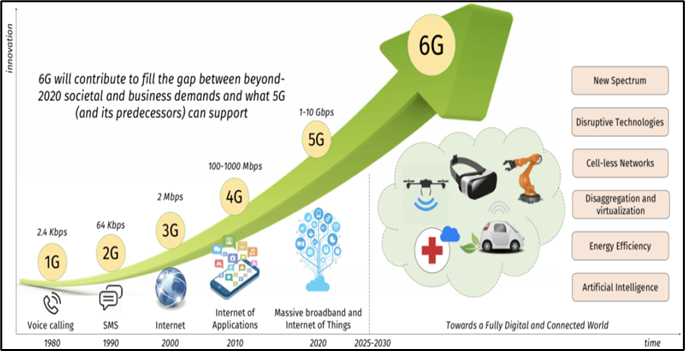Why in News?
- Recently, the Prime Minister of India has unveiled a vision document - Bharat 6G Vision - for rollout of 6G/6th generation communications technology in India by 2030.
- As part of its 6G mission, India will identify priority areas for research by involving all stakeholders, demonstrations and early market interventions through startups.
What’s in Today’s Article?
- What is the Background in which Bharat 6G Vision was Launched?
- What is 6G?
- What is India’s 6G Roadmap?
- How are Other Countries Looking at the 6G Rollout?
What is the Background in which Bharat 6G Vision was Launched?
- At present, the total annual purchase of smartphones is greater than 16 crore smartphones for about 30 crore Indian households.
- This means that every household today is buying smartphones at an average of one phone every 2 years, indicating that a typical Indian finds a personal smartphone as valuable and necessary as a personal vehicle.
- The PM of India formally launched 5G services in October 2022 and said that India should be ready to launch 6G services in the next 10 years.
What is 6G?
- Technically, not in existence today, 6G has been conceived as a far superior technology than 5G.
- As opposed to 5G, which at its peak can offer internet speeds up to 10 gigabits per second, 6G promises to offer ultra-low latency with speeds up to 1 terabit per second (100 times faster than 5G).
- Its application will include remote-controlled factories, constantly communicating self-driven cars and smart wearables taking inputs directly from human senses.
- However, since the majority of 6G supporting communication devices will be battery-powered and can have a high carbon footprint, it will also need to be balanced with sustainability.

What is India’s 6G Roadmap?
- The Bharat 6G project will be implemented in two phases and the government has also appointed an apex council to oversee the project and focus on issues such as
- Standardisation,
- Identification of the spectrum for 6G usage,
- Create an ecosystem for devices and systems, and
- Figure out finances for research and development, etc.
- In phase one (from 2023 to 2025), support will be provided to explorative ideas, risky pathways and proof-of-concept tests.
- Ideas and concepts that show promise and potential for acceptance by the global peer community will be adequately supported to develop them to completion, leading to commercialisation as part of phase two (from 2025 to 2030).
- To fund research and innovation on 6G, the document recommended the creation of a corpus of Rs 10,000 crore to facilitate various funding instruments such as grants, loans, VC fund, etc.
- To decide on standardisation around 6G and related technologies, the document called for India to take on a greater role in various international bodies such as 3GPP, ITU, IEC, and IEEE.
How are Other Countries Looking at the 6G Rollout?
- South Korea has outlined a 6G research and development plan with Rs 1200 crore worth of investments in the first phase running till 2025.
- In Japan, the Integrated Optical and Wireless Network (IOWN) Forum has published its Vision 2030 for 6G for infrastructure evolution in four dimensions: cognitive capacity, responsiveness, scalability, and energy efficiency.
- Key developments in 6G have also been identified and are being pursued in China, in order to support connectivity plus sensing plus AI.










